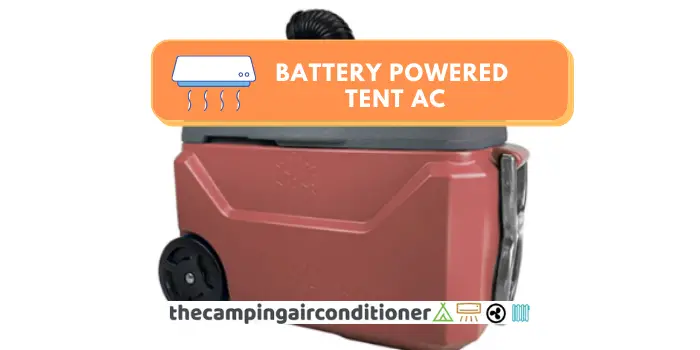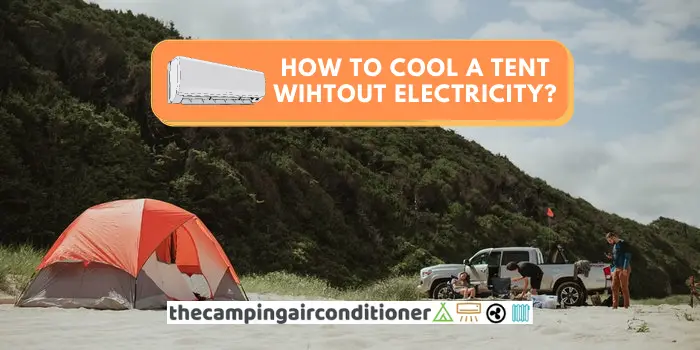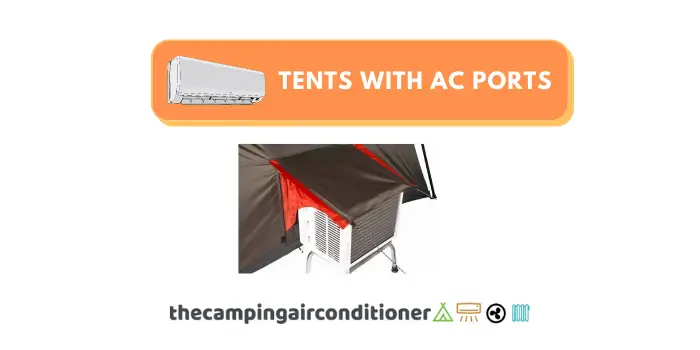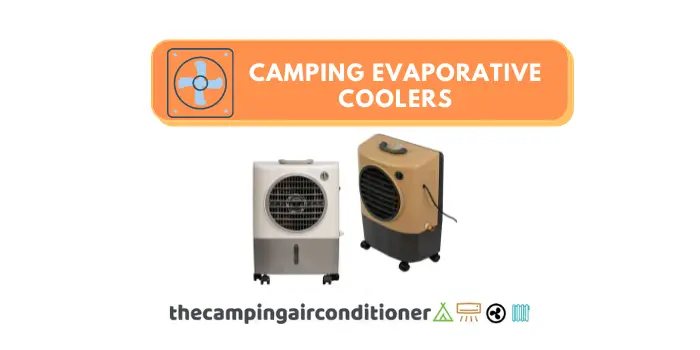Camping during summer days is one of our preferred activities. Enjoying the sunlight with our kids, dog, and friends make us relax and increase our vitamin D intake. However, we all know how sometimes summer camping can get unbearable with scorching and humid weather.
Having a tent air conditioner has dramatically helped us improve our camping experience on these warm days. But how to insulate a tent for AC? We have prepared 6 excellent tips for you:
- Use a tent tarp
- Use duct tape and/or pool noodles to suppress any minor leakage
- Insulate your tent floor
- Cover your tent with thermal blankets
- Check your tent material
- Use a tent with AC Ports

Why do you need to insulate your tent for AC?
A straightforward response is: because you want to keep the cool air trapped inside your tent. If you are using a tent ac, the last thing you want is the chilly breeze to leave your shelter.
And, how can you do it?
You need to create thermal barriers to retain the cold air inside your tent and avoid hot air inflow.
How to insulate a tent for AC - Tips
Tip 1 - Use a tent tarp
Overall, tent tarps are cheap, easy to handle, and a useful insulating tool. Covering your tent with it will help create a thermal barrier between your shelter and the warm environment around it.
We recommend using reflective models to mirror UV rays and avoid the warm air getting trapped inside your tent.
Further, reflective tarps are waterproof, which can also help on rainy days if you use a tent with high breathability levels.
Since they will be exposed to sunlight (and potentially water), we suggest buying heavy-duty versions, which come with internal metal and structural reinforcements to improve material durability and stability.
Reminder: Make sure that you check your tent dimensions and buy the tarps accordingly (you might need more than one unit).
Heavy Duty Tarp Recommedations
Tip 2 - Use duct tape and pool noodles to suppress any minor air leakage
Even the minor holes might be harmful to your tent insulation. They create cold air leaking opportunities that might decrease the efficiency of your tent air conditioner.
When it comes to insulating these minor openings, we suggest the following:
- Use Duct tapes – They are better suited for little existing tent patches and sealing critical areas, such as the tent ac port.
- Pool noodles – The foam used to manufacture pool noodles has outstanding insulating features. You can use it in combination with duct tapes to seal leaking points.
If you plan to use a window AC, we noted that the critical leakage zone is close to the AC port.
Placing the pool noodles around the ports and fixing them with duct tape solves this issue.
Tip 3 - Insulate your tent floor
Insulating your tent floor will ensure there is no heat exchange with the soil during the day, keeping your tent as cool as possible.
Our suggestion is to use foam tiles, given their ease of implementation. The insulation process is very simple: put a layer of reflective foam on top of the tent floor and then place the foam tiles above it – that is it!
The sketch below indicates how you should arrange the layers. You can also use yoga mats instead of foam tiles.
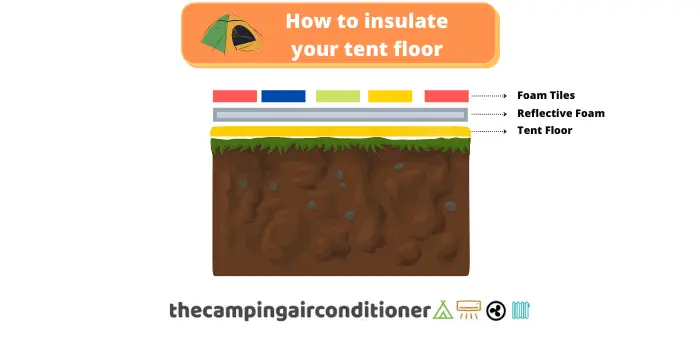
Recommend material for floor insulation
Tip 4 - Cover your tent with thermal blankets
Apart from using a heavy-duty tent tarp, you can also cover your tent with thermal blankets. It will help to trap your AC’s cold breeze even more!
There is no secret here – simply throw it over the tent. If you are camping in windy conditions, it might be worth covering it with an old blanket to avoid it getting blown away.
Tip 5 - Check your tent fabric (material)
Yes, the tent fabric can heavily influence your experience on camping. If you want to learn more about tent fabric, read our detailed article on what tents are made of.
Overall, there are 3 dominant fabrics:
- Polyester
- Nylon
- Canvas
You can find other alternatives, such as poly-cotton and DCF, but they are not as used as these three.
Polyester and Nylon tents have great durability and come with great waterproofness because of their manufacturing process. On the other hand, they are known to heave low breathability levels, inducing potential condensation inside your tent.
Overall, they do not have poor insulation. However, they might come with extra coatings to improve their sealing features.
Canvas tents are probably the best option for summer camping. Canvas is made of cotton that has low heat retention properties. They have excellent insulation features that might increase the efficiency of your AC.
Bear in mind, though, that canvas tents are usually bulky and heavy!
Tip 6 - Use a tent with AC ports
These days, multiple tent models already come with ac ports included. They are specially designed to support the cooling devices, including placeholders for electrical cables.
Tent with AC ports recommendations:
If you want to read a detailed review of each tent, read our article on tent with ac ports.
FAQ
Can I put an air conditioner in a tent?
Yes, there are no problems with it. Ensure that you properly insulate your tent with the tips detailed above, or buy a tent with an ac port.
How can I cool down my tent without electricity?
There are several ways to cool down your tent without electricity. We recommend the following:
- Choose the suitable tent fabric (read our article on what tents are made of)
- Pick the perfect spot to pitch your tent.
- Set your tent up at the right time
- Purchase battery-powered cooling devices (fans and tent ac)
- Use reflective blankets to insulate your tent
- Cooldown your body
- Watch the ventilation of your tent.
- Do not use a sleeping bag.
If you want to read more about these tips, read our article on how to cool down a tent without electricity.
How to avoid condensation in my tent?
We recommend the following:
- Ensure there is enough ventilation
- Keep humid and wet stuff outside the tent
- Don’t pitch your tent too close to the water
- Turn heaters off, as they might increase vapour formation.
Is there a best tent color for summer camping?
Overall, lighter colors tend to retain less heat and, therefore, be more appropriate for summer camping. However, a number of facts should be taken into account with regards to your tent color, such as:
- Aesthetics
- Safety reasons
- Mosquito and bug repellent
- Effects on sleeping quality
- Heat absorption
If you want to read more about it, read our detailed post on tent colors.
What is the best tent for summer camping?
We recommend using 2 or 3-season tent options. The 3-season will generally be more robust with better durability.
As for tent fabric, canvas tents are our preferred models.
How do I insulate my tent for winter camping?
The insulating process for winter camping is very similar to the one used for summer camping, apart from minor details. We recommend the following:
- Choosing the right insulating material
- Fixing them properly in your tent
- Insulating your tent floor
- Using the most suitable tent
- Using smaller tents
- Pitching your tent in areas with limited wind exposure
- Using a tent heater
- Using a suitable sleeping bag
If you want to know more about it, read our detailed article.
Can I DIY my tent AC port?
Even though we don’t envisage problems with the DYI approach, you need to ensure that you have the proper skills and tools. Overall, we do not recommend it since you might permanently damage your tent.
What are the alternatives for camping ACs?
Among all the alternatives, we recommend considering:
Conclusion
A tent AC will help you tackle the warm and humid days during summer camping. However, if you want to improve its efficiency, make sure that you follow the tips detailed above.
We hope these tricks will help you have a chilly environment during your hot camping days.












